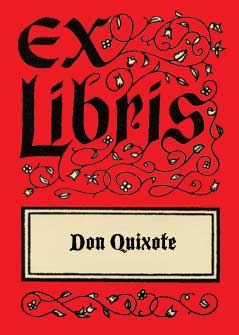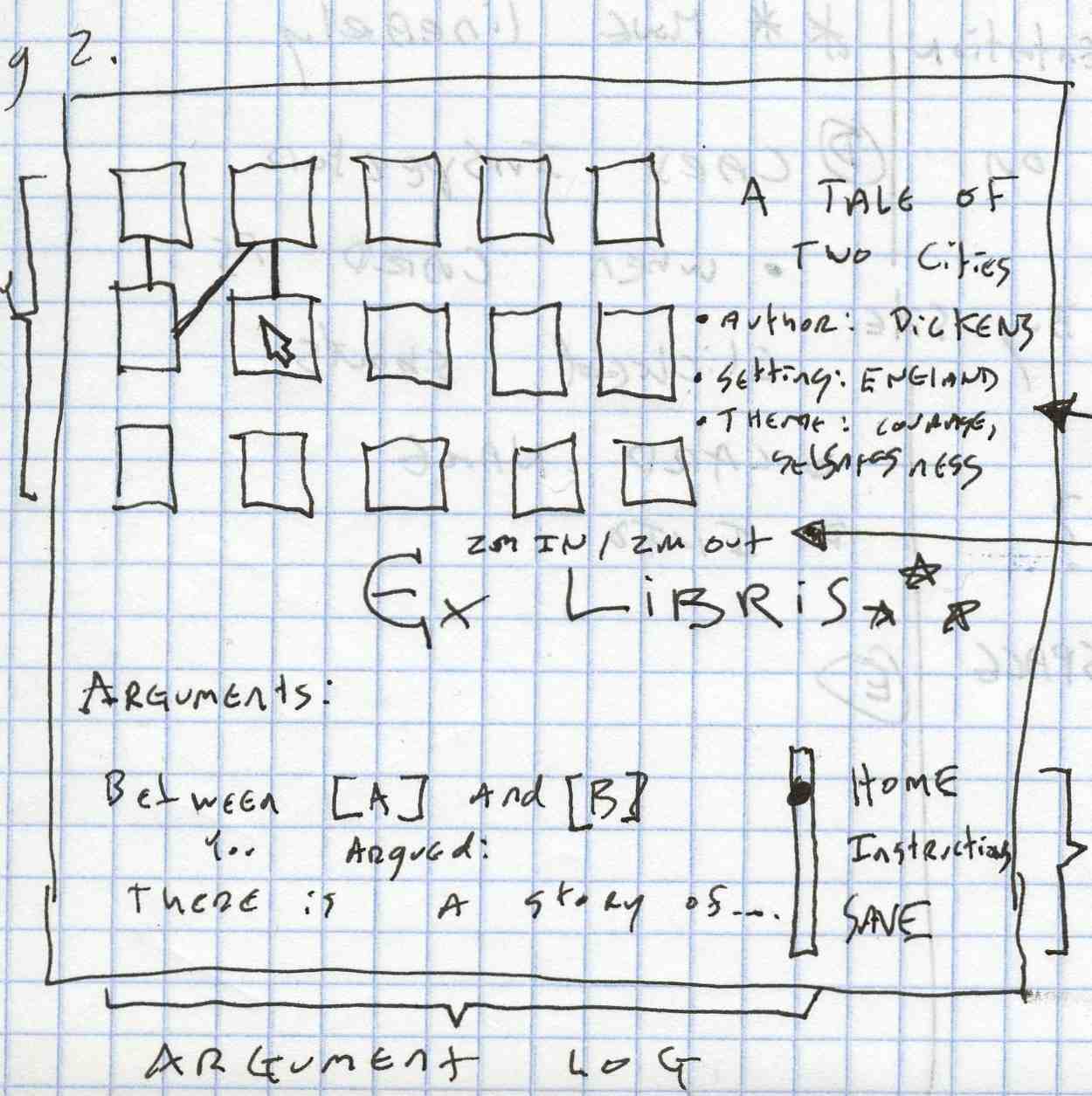build, play, test, (re)build.
making up a game is not child's play

Moving Ex Libris from the concenptual phase into the realm of the real began with modeling the cards. For a week, I stayed up late composing a set of "mock" cards that turned out so well, I decided to use them as rough prototypes for the rest of the semester. Each card represented a book, and contained the book's title, an illustration, a quote that represented the style of the language, and a data field that provided small bits of information like author, setting, theme, genre, and form (see the Don Quixote Card below) . On the other side, I used a rendering of a woodcut 'Ex Libris' (see sidebar) and filled in the book's title into the name plate text field.
 Once I had the cards designed and printed, I began playtesting them. I had to create rules of movement, rules for connections, and rules for completing the game. This one of the hardest parts of the game's design. Ideologically, I wanted to keep the game's structure open and discussion-oriented,but simultaneously, I needed to require some form of justification for connecting cards. On one hand, I didn't want for there to be a "right" reason for connecting cards, but without the need to make the "right" connections, players might just make any connections.
Once I had the cards designed and printed, I began playtesting them. I had to create rules of movement, rules for connections, and rules for completing the game. This one of the hardest parts of the game's design. Ideologically, I wanted to keep the game's structure open and discussion-oriented,but simultaneously, I needed to require some form of justification for connecting cards. On one hand, I didn't want for there to be a "right" reason for connecting cards, but without the need to make the "right" connections, players might just make any connections.
The compromise came in designing two main styles of play, one for an experienced reader, which I refer to as the 'Collegiate' and the other for a less experiencd player, which I called the 'Junior Varsity.'' In the JV version, players are required to make connections based on the provided data. They must use the author's name, form, genre, themes, and settings to draw connections between the books. 'Alice in Wonderland' and 'Canterbury Tales,' for instance could be connected because they both take place in England. With this style of play, there is no discussion, only objective testing of knowledge. This style of play also does not require that the players know the books, but allows for a sort of "Memory" stylized knowledge of the cards to be succesful.
 The Collegiate style of play puts the power of connection into the hands of the players. To connect cards, players must create their own arguments of shared themes, literary values, author's ideologies, or any other reason that the two books should be considered linked. This series of arguments, like Academe, is peer-reviewed allowing the community of players to assess which argument is superior and create that connection.
The Collegiate style of play puts the power of connection into the hands of the players. To connect cards, players must create their own arguments of shared themes, literary values, author's ideologies, or any other reason that the two books should be considered linked. This series of arguments, like Academe, is peer-reviewed allowing the community of players to assess which argument is superior and create that connection.
After playtesting these two styles of play, it became clear that a third alternative, one with explicit competition was necessary. One of my instructors in MCM, Anton Soderman, suggested that I create a team version. As a result, I developed a team variation of Ex Libris were players could work together in groups of two or three against other units, creating team arguments that would be approved or rejected by a judge. See "The Rules" in the sidebar for more information.
The two biggest problems that emerged in playtests was a lack of familiarity with the materials and a lack of inspiration to complete the puzzle. Often the game worked as a conversation starter (which was part of my intent) derailing gameplay in favor of discussions about whether Moby Dick was a whale or an imagined symbol of aspiration that all men can relate to. To overcome lack of familiarity with the texts, I will soon release a second set of cards, that will feature more contemporary (and hopefully more familiar) books as playing cards.
 Currently, I working on the online Ex Libris, a project that in contrast to the card game will require much more work, and new solutions to old problems. Since I do not imagine that people will play Ex Libris communally online, I am considering the creation of a user base and system of digital peer review (not unlike Digg) that will allow users to assign ratings to any connection between books. Further complexities, like coding, graphical considerations, and making online gameplay intuitive will slow my attempts to 'complete' Ex Libris.
Currently, I working on the online Ex Libris, a project that in contrast to the card game will require much more work, and new solutions to old problems. Since I do not imagine that people will play Ex Libris communally online, I am considering the creation of a user base and system of digital peer review (not unlike Digg) that will allow users to assign ratings to any connection between books. Further complexities, like coding, graphical considerations, and making online gameplay intuitive will slow my attempts to 'complete' Ex Libris.
